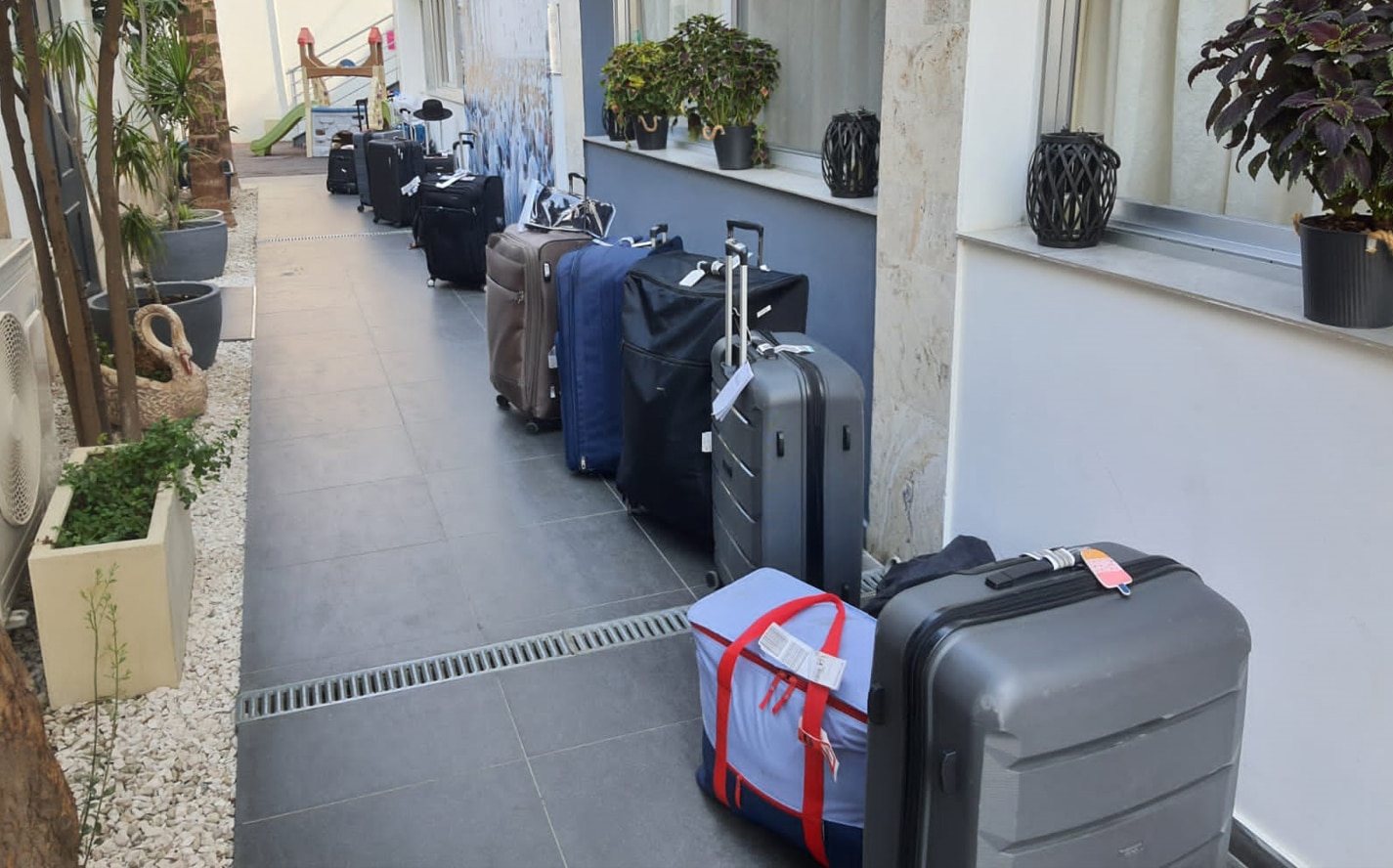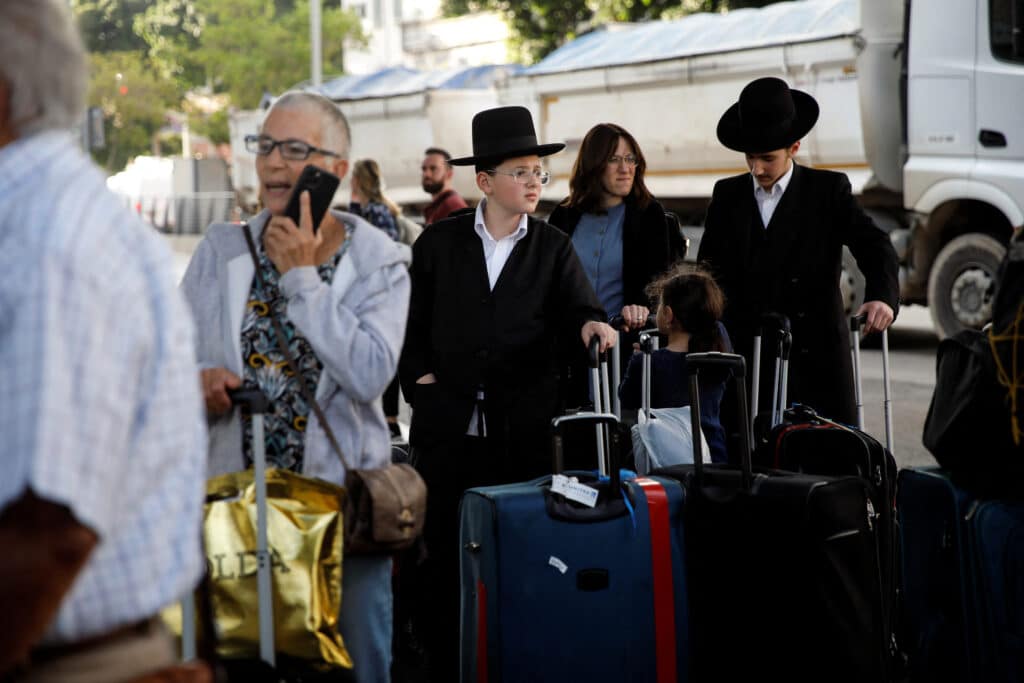Immediately after the Hamas attack on October 7, Limassol port became a haven for fleeing Israelis, welcoming the first passengers arriving from Haifa on October 12.
And Cyprus was not left unscathed by the sight of thousands of Israelis disembarking, leaving behind their homes, and painting a poignant picture of displacement and uncertainty.
They were escaping – if only temporarily – the horrific slaughter of 1,200 Israeli civilians and military by Hamas. That attack was swiftly followed by Israeli retribution on a grand scale with over 20,000 Palestinian deaths, according to Gazan health authorities, and civilians desperately scrambling for somewhere safe to avoid relentless Israeli bombardments.
“Our hearts are crying that we have to leave our country,” lamented a distraught Israeli disembarking at Limassol port.
Suitcases were strewn outside the synagogue in Larnaca, as over 2,000 people sought refuge and help from the Jewish community on the island in just the first few weeks after the October 7 attack, according to its public affairs chief Menachem Raskin.
Larnaca airport was packed with Israeli nationals also trying to fly back – many wanting to join the fight against Hamas – even as scores of families travelled in the opposite direction, making their way to Cyprus for safety.
“Since the Holocaust, we have never seen anything like that,” Raskin told the Cyprus Mail.
One man who left Israel with his wife and three children told the Cyprus Mail at Larnaca airport they got on the first flight they found.
“The thing that hurts the most is that we don’t know when we will return yet,” he said. “Cyprus is close enough to be able to go back fast, but we don’t know when.”
Shortly after, Cyprus transformed into a stage for impassioned displays of solidarity and discord. On October 17, hundreds gathered in Larnaca at a pro-Israeli demonstration. Banners held high and voices united echoed a fervent allegiance to Israel’s stance amidst the escalating conflict.
“We stand united in our support for Israel’s right to defend itself,” resonated through the crowd, embodying the unwavering commitment of those in attendance.
However, the conflict continued to escalate, drawing starkly contrasting responses. The Israeli ambassador to Cyprus Oren Anolik voiced concerns, stressing the imperative of self-defence in the face of looming threats.
“If we cannot fight for our defence, they will butcher us,” the ambassador told the Cyprus Mail, painting a stark picture of the perceived dangers confronting Israel.
Conversely, the Palestinian ambassador to Cyprus Abdallah Attari denounced Israel’s response, vehemently labelling the events in Gaza, pummelled by Israeli airstrikes after the attack, as nothing short of genocide.
“What is happening is genocide, it is ethnic cleansing, it is slaughter. I do not hesitate to use these words,” said Attari, encapsulating the anguish and outrage over the unfolding tragedy.
“This barbarism and genocide happening in Gaza serves a goal. To displace Palestinians from Gaza to Egypt and from the West Bank to Jordan.”
The intensification of hostilities triggered a parallel surge in demonstrations. A significant protest, organised by the Cyprus Peace Council and other non-governmental organisations (NGOs), unfolded in Nicosia on December 3, fervently advocating for a Gaza ceasefire.
The gathering, marked by impassioned speeches and waving flags, underlined the nation’s divided stance and compassionate concern for the plight of the Palestinian people.
“We demand an immediate ceasefire to end the suffering of innocent civilians,” the demonstrators said.
During the demonstration, the head of the Cyprus Peace Council Haris Pashas likened the plight of the Palestinian people to the one experienced by Cypriots after the 1974 invasion.
“The fight against imperialism and to defend peace, freedom and of justice is common to all the peoples on earth,” Pashas said.
He said the goal of the march was to send a “strong message in all directions” that the Palestinian people are not alone.
Amidst the turmoil ensuing from the conflict’s fallout, the Cypriot government proposed a humanitarian aid corridor to address the crisis.
The initiative sought to establish a passage for humanitarian assistance to reach the thousands distressed and displaced people in Gaza with Cyprus as a transit hub.
The proposed corridor was met with deliberation and discussions involving key stakeholders, including the Cypriot government, the European Union, the UK defence ministry and Israeli technocrats.
However, doubts arose regarding the feasibility of the plan, both regarding both Cyprus’ readiness to coordinate the efforts and Gaza’s logistic capabilities to receive large scale humanitarian aid after much of its infrastructure was destroyed by Israeli air strikes.
That said, the envisioned corridor holds potential as a lifeline amidst the escalating crisis. Its proposed implementation would offer a means to deliver essential aid, including medical supplies, food, and humanitarian assistance, to mitigate the dire circumstances faced by the Palestinians.
In the meantime, Cyprus joined 152 other countries in voting in favour of a United Nations General Assembly resolution which called for an immediate humanitarian ceasefire in Gaza, as well as the immediate and unconditional release of all hostages, a U-turn from the country’s abstention in the previous vote at the UN body, in light of the increasingly desperate situation faced by the Palestinian population.








Click here to change your cookie preferences